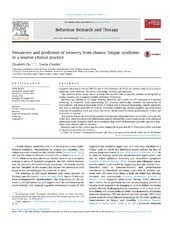| dc.contributor.author | Flo, Elisabeth | en_US |
| dc.contributor.author | Chalder, Trudie | en_US |
| dc.date.accessioned | 2014-12-30T10:07:20Z | |
| dc.date.available | 2014-12-30T10:07:20Z | |
| dc.date.issued | 2014-08-26 | eng |
| dc.identifier.issn | 0005-7967 | |
| dc.identifier.uri | https://hdl.handle.net/1956/9054 | |
| dc.description.abstract | Cognitive behavioural therapy (CBT) is one of the treatments of choice for patients with chronic fatigue syndrome (CFS). However, the factors that predict recovery are unknown. The objective of this study was to ascertain the recovery rate among CFS patients receiving CBT in routine practice and to explore possible predictors of recovery. Recovery was defined as no longer meeting Oxford or CDC criteria for CFS measured at 6 months follow-up. A composite score representing full recovery additionally included the perception of improvement, and normal population levels of fatigue and of physical functioning. Logistic regression was used to examine predictors of recovery. Predictors included age, gender, cognitive and behavioural responses to symptoms, work and social adjustment, beliefs about emotions, perfectionism, anxiety and depression at baseline. At 6 months follow-up 37.5% of the patients no longer met either the Oxford or the CDC criteria for CFS while 18.3% were fully recovered. Multivariate analyses showed that worse scores on the work and social adjustment scale, unhelpful beliefs about emotions, high levels of depression and older age were associated with reduced odds for recovery. Recovery rates in this routine practice were comparable to previous RCTs. There was a wide spectrum of significant predictors for recovery. | en_US |
| dc.language.iso | eng | eng |
| dc.publisher | Elsevier | eng |
| dc.rights | Attribution CC BY | eng |
| dc.rights.uri | http://creativecommons.org/licenses/by/3.0/ | eng |
| dc.subject | Chronic fatigue syndrome | eng |
| dc.subject | Recovery | eng |
| dc.subject | Cognitive behavioural therapy | eng |
| dc.subject | Follow-up | eng |
| dc.subject | Longitudinal | eng |
| dc.title | Prevalence and predictors of recovery from chronic fatigue syndrome in a routine clinical practice | en_US |
| dc.type | Peer reviewed | |
| dc.type | Journal article | |
| dc.date.updated | 2014-12-30T10:03:34Z | |
| dc.description.version | publishedVersion | en_US |
| dc.rights.holder | Copyright 2014 The Authors | |
| dc.identifier.doi | https://doi.org/10.1016/j.brat.2014.08.013 | |
| dc.identifier.cristin | 1162604 | |
| dc.source.journal | Behaviour Research and Therapy | |
| dc.source.40 | 63 | |
| dc.source.pagenumber | 1-8 | |

